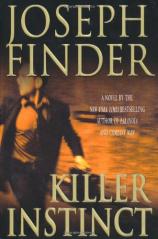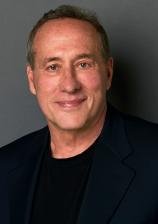Interview: May 19, 2006
May 19, 2006
Joseph Finder, the New York Times bestselling author of such stand-alone thrillers as PARANOIA and COMPANY MAN, recently spoke with Bookreporter.com's Carol Fitzgerald, Joe Hartlaub and Wiley Saichek. In this interview, Finder discusses the real-life inspirations behind the characters in his latest thriller, KILLER INSTINCT, and explains why he chose to set them in the world of consumer electronics. He also describes the intensive research required for each of his novels, gives details on a pending big-screen adaptation of PARANOIA, and shares his thoughts on the possibility of writing a series.
Bookreporter.com: Plasma screen televisions and the people who sell them hardly would seem to be compelling fodder for a modern thriller. Yet KILLER INSTINCT uses those elements to create an addictive and compelling read. What inspired you to choose the world of consumer electronics as the topic for a novel?
Joseph Finder: Glad you enjoyed the story! But I'm not sure I agree with the premise of your question. The world of salespeople has always made great drama --- ever see David Mamet's Glengarry Glen Ross? Not to mention Death of a Salesman. And the millions of readers of Michael Crichton's DISCLOSURE can tell you that a thriller set in something as mundane-sounding as a company that makes disk drives (!) was actually quite gripping.
The truth is, I think that professional book people tend to be a bit out of touch with the more than hundred million people in this country alone who work in business and the corporation. In fact, I'd go further --- I think that a vast majority of Americans spend most of their working hours in the workplace, and they know that it's in many ways a microcosm of the whole world. There's ambition and success, there's greed and generosity, there are duplicitous colleagues and close friends.
It just so happens, though, that there are hardly any novels set in the world in which most of us spend most of our time. Law firms, sure. Police forces, always. But the sort of thing that John Grisham does for lawyers, I'm hoping to do for everyone else in the working world. And it seems that people are starting to catch on.
I chose the plasma TV business for one simple reason: I was fascinated by it. I'm a gadget guy, I'll admit, and I'd just bought a flat-screen TV so my daughter (and I) could watch the Red Sox in high definition. I wanted to know more about how these things work. Each of my last three novels has been set in a different kind of company. I thought a company that made and sold flat-screen TVs could be really interesting as a setting. And I was right. The research was fascinating.
BRC: Kurt Semko is a memorable character. Those opening scenes, where Jason Steadman is sitting in the cab of Semko's tow truck, foreshadow what is to come and are some of the most compelling passages in KILLER INSTINCT. What was your inspiration for Semko?
JF: I got to know a number of Special Forces operatives in the Boston area while I was researching KILLER INSTINCT. The ones I became friends with were smart, funny and genial. This was a great disappointment, since I wanted someone who had a cruel streak, who could be both charismatic and manipulative. Several of them told me about a few of their colleagues --- bad seeds who came back from Afghanistan or Iraq and got into serious trouble --- and that's when Kurt Semko began to come to life.
BRC: Science fiction novels some six decades ago predicted that corporations, as well as nations, would be at war in the future. KILLER INSTINCT demonstrates how, at many levels, this has come true. Steadman has as much to fear from his co-workers as he does from the competition. Were some of the events in KILLER INSTINCT based upon war stories you've heard from sales managers for various companies? Are the characters modeled after individuals you have known, or have heard of anecdotally?
JF: A lot of what happens in KILLER INSTINCT is based on stories I heard in my research. Not that this kind of thing happens often. But I took the extreme examples, the worst case scenarios. This is, after all, suspense fiction. And sure, I turned the dial up to eleven (to quote Spinal Tap). I created Jason, my hero, out of a number of people I met --- friendly, amiable, low-key, likeable. And his colleagues were based on people I met as well. I think that's why so many of them feel real or recognizable to my first readers. I've painted them from life.
BRC: On a related note, there is a passage in KILLER INSTINCT that takes place at TechComm, wherein Kent "Gordy" Gordon, Steadman's boss, delivers an embarrassing soliloquy. This passage had a sold ring of truth to it. What was your inspiration for this?
JF: Ah, yes. What happens to Gordy is based on a real story I heard --- about a real VP of sales who did something very similar at a kickoff, and got in real trouble. But for a variety of reasons --- legal, and not to spoil the story --- I shouldn't say any more.
BRC: One of the most enjoyable aspects of KILLER INSTINCT and your other novels is the way you take a topic that is largely outside the scope of public experience --- in the case of KILLER INSTINCT, the sale and marketing of advanced-technology television sets and monitors --- and pull the curtain back to reveal what lies behind the scenes. How do you choose which industry to write about? How much time do you spend on research and gaining access to the industry of your choice prior to beginning the actual writing? Do you continue to research as you write? Do you share portions of the manuscript with your sources?
JF: When I read a thriller, I want to visit a new world, experience and learn things I didn't know. It has to be interesting to my readers, of course. But it has to be really interesting to me, since I have to spend a year immersed in it. So I pick something I want to find out more about. Not just the very cool technology in the plasma business, but the high-testosterone, high-pressure sales end of things. Each of my novels is set in a different industry, sort of like Arthur Hailey used to do. I don't like to repeat myself. I don't like to write the same book over and over again, as many of my writer colleagues seem to do. How incredibly boring both for me and for my readers!
I usually spend a month or so researching the industry in which my new novel is set. Then a couple of months interviewing people who work in it, traveling and visiting these companies, getting to know them well enough to portray them. I need to delve in deep enough to get the texture, the rhythms, the way people talk, their concerns. Once I feel I have a handle on it --- enough to tell the story with authority, anyway --- then I start plotting and then writing.
And yes, as I write, I do find that I need to call or email my few trusted sources and ask them questions. How might this happen? Would this ever taken place? Has this ever happened? Once in a while I give portions of a manuscript to an expert --- I've done so with my homicide experts when I was writing COMPANY MAN, so the murder investigation plot would ring true. But usually I don't have to.
BRC: What are the most challenging aspects about writing a novel set in a corporate environment?
JF: I guess the toughest part is getting the details right, the things that my characters would think about and talk about and worry about. Since every company I write about is different, the stuff they do is different, and I need to get that exactly right. I'd say that's what I find most challenging. The thing is, I need to become an instant expert in whatever my fictional company does --- whether it's cell phones and BlackBerrys or fancy office furniture or flat-screen TVs. Not that I'm going to bore my readers with every last detail. Not at all. But I need to know it way better than most of my readers do so I can simplify it, predigest it for my readers, make it smooth, make the story fly by.
BRC: What is your writing schedule like? How many hours per day do you work? Do you prefer outlining, or simply letting things take their course? And how many months does it normally take you to finish a work, from concept to final draft?
JF: I don't write every day, but I do work every day. That might be plotting or research, or just taking notes. And I work easily 10 hours a day. When I'm writing full blast, I probably work 16 hours a day, getting up at 3 or 4 in the morning. When I start writing, it usually takes me 3 or 4 months, no more, to finish a good draft. Then another month or so to do a final draft. But I can only start writing when the well is filled up --- when I know enough to start telling the story.
BRC: You write stand-alones, not series titles. What attracts you to this? Has there ever been a character that you have thought about anchoring a series around?
JF: I write thrillers, not police procedurals, not private-eye books. Novels whose heroes are investigators --- those are the ones that can have series characters. My characters have incredibly dramatic, scary things happen to them. They don't just stand back, crack wise and break noses. Their lives are in peril. They change in the course of the book. No way could you do that with a series character, who must remain fairly consistent from novel to novel.
The only character I've written who could make a series is Audry Rhimes, from COMPANY MAN. And who knows...maybe...
BRC: Your novel HIGH CRIMES was adapted into a commercially successful film. Are any of your other novels in some stage of film development?
JF: PARANOIA was sold to Paramount. They got Michael Tolkin, author of THE PLAYER, to write a script, which turned out to be brilliant. It could be a great movie --- someday. But then Paramount had a regime change, and the new regime did what always happens in Hollywood --- they threw out every project put into development by their predecessors. I've given the producer a few months to try to set PARANOIA up at another studio. I'll check in with him fairly soon to see what progress he's made. I think PARANOIA could make a great movie. We'll see.
BRC: What can you tell us about your next novel?
JF: Not much. Just that it involves the aerospace industry --- a company that makes jet planes --- and it's an incredibly exciting story, moreso, and with more action, than any I've written to date.
You can tell I'm enjoying it.




